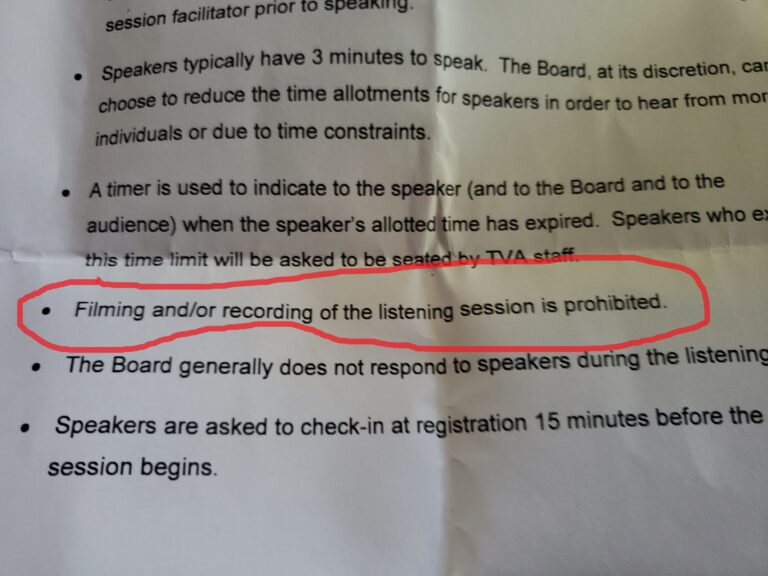Displaying items by tag: tennessee lookout
Highlander Folk School, training ground for civil rights leaders, fights to regain land
 An example of anti-civil rights fearmongering and slander directed at the Highlander Folk School. Civil Rights Heritage Museum
An example of anti-civil rights fearmongering and slander directed at the Highlander Folk School. Civil Rights Heritage Museum
A dispute over a pending land sale raises new questions about whom historic preservation is for.
This article was originally published by Tennessee Lookout. Cari Wade Gervin is a freelance journalist based in Chattanooga. You can find more of her writing on social media @carigervin or at carigervin.substack.com.
MONTEAGLE — This much is not in dispute: In 1961, the state of Tennessee took 200 acres of land from Highlander Folk School on Monteagle Mountain in Grundy County. Took, as in confiscated on bogus charges of alcohol sales without a license.
But the real reason for the confiscation stemmed from fears of civil rights and union activism after two decades of training now-icons such as Rosa Parks and Diane Nash at Highlander.
This much is also not in dispute: Five plots of that now subdivided land are owned by a nonprofit called the Tennessee Preservation Trust (TPT). The sale of those plots to Todd Mayo, the for-profit owner of The Caverns, a rural concert venue, is pending. And the current Highlander administration, which had its offer to buy the land rejected, is furious.
Everything else — what happened to TPT, whether they ever had plans to sell the land back to Highlander, what might happen to those plots now and the land next to them that TPT doesn’t own — well, the answers vary depending on whom you ask.
On the one hand, TPT preserved some historic buildings that might very well have been lost. On the other hand, the original (and some would say, still rightful) owner of those buildings has been shut out from determining what happens to them.
Still others question whether a group of white men are the right ones to tell the story of the storied civil rights training ground.
Pending state conservation deal would protect forest and water resources
 A man paddles down the main stem of the Wolf River in West Tennessee. The state is working to purchase 5,477 acres of forest land near Grand Junction from the Hobart Ames Foundation. The land is part of the Wolf River watershed. Wolf River Conservancy
A man paddles down the main stem of the Wolf River in West Tennessee. The state is working to purchase 5,477 acres of forest land near Grand Junction from the Hobart Ames Foundation. The land is part of the Wolf River watershed. Wolf River Conservancy
The roughly 5,500-acre property features wetland forest used for research by the University of Tennessee
This article was originally published by Tennessee Lookout.
GRAND JUNCTION — About 60 miles east of Memphis near the Mississippi line, verdant hardwood trees and ecologically exceptional streams weave through thousands of acres of rolling hills.
The land is home to a diverse array of aquatic and terrestrial life, decades-old archaeological sites and a watershed that feeds into the aquifer where hundreds of thousands of Memphians source their drinking water.
If all goes to plan, 5,477 acres of this land will soon become Tennessee’s newest state forest, securing its preservation for posterity.
The land is a portion of the 18,400-acre historic Ames Plantation, a privately owned tract in Fayette and Hardeman Counties amassed by Massachusetts industrialist Hobart Ames in the early 1900s.
- memphis aquifer
- memphis drinking water
- land conservation
- west tennessee land preservation
- drinking water protections
- cassandra stephenson
- tennessee lookout
- conservation fund
- ames plantation
- wolf river
- wolf river conservancy
- ut ag research
- hobart ames foundation
- tennessee state forests
- state forests in tn
- grand junction, tennessee
- ford blue oval
- heritage conservation trust
- forest service legacy program
Federal home energy rebate dollars are rolling out to states
 The state of Tennessee will partner with the Tennessee Valley Authority to carry out a federal home energy efficiency rebate program that was included in the federal Inflation Reduction Act. Getty Images via Tennessee Lookout
The state of Tennessee will partner with the Tennessee Valley Authority to carry out a federal home energy efficiency rebate program that was included in the federal Inflation Reduction Act. Getty Images via Tennessee Lookout
What might Tennessee’s energy-efficiency rebate plan look like, and when?
This article was originally published by Tennessee Lookout.
NASHVILLE — More than $8 billion flagged for home energy rebates in the Inflation Reduction Act is beginning to trickle out of federal coffers, but Tennessee residents will likely have to wait until the spring of 2025 to start applying for their chunk of change.
Each state must shape its own plan to dole out the funding, which can put money residents spend on energy efficiency upgrades back into the households’ pockets if they meet certain requirements. New York and Wisconsin became the first states to begin offering federally funded home energy rebates to their residents in mid-August, two years after President Joe Biden signed the Inflation Reduction Act and its many energy-focused subsidies into law.
In total, the rebate funds are expected to impact between 1 to 2 percent of households across the nation.
Tennessee submitted its application to the U.S. Department of Energy (DOE) for the more than $167 million earmarked for the state in mid-August. Tennessee’s 2025 rollout timeline largely depends on how quickly the DOE approves the state’s applications and when Tennessee can execute a contract with the Tennessee Valley Authority — its chosen implementer — to put the program into action.
- home energy rebates
- clean energy
- energy efficiency
- can i get a home energy rebate?
- inflation reduction act
- home efficiency rebates
- biden clean energy
- inflation reduction act tennessee
- home electrification and appliance rebates
- tennessee home energy efficiency rebates
- cassandra stephenson
- tennessee lookout
- tva energy efficiency plan
- federal energy rebates
Tennessee Valley Authority faces a push to get greener and more transparent
 Nanette Mahler, left, and Tracy O’Neill walk along Macon Wall Road in Cheatham County, Tennessee, near the site of a proposed Tennessee Valley Authority gas power plant project. Local backlash against the proposal comes as the federal utility faces bipartisan legislation in Congress seeking to boost transparency in its planning process and scrutiny of TVA’s anemic renewable power growth compared to other utilities. Robert Zullo/States Newsroom
Nanette Mahler, left, and Tracy O’Neill walk along Macon Wall Road in Cheatham County, Tennessee, near the site of a proposed Tennessee Valley Authority gas power plant project. Local backlash against the proposal comes as the federal utility faces bipartisan legislation in Congress seeking to boost transparency in its planning process and scrutiny of TVA’s anemic renewable power growth compared to other utilities. Robert Zullo/States Newsroom
TVA ‘clearly a laggard’ in renewable energy
This article was originally published by Tennessee Lookout.
ASHLAND CITY — When he heard about the sale, Kerry McCarver was perplexed.
In 2020, the mayor of rural Cheatham County discovered that the Tennessee Valley Authority bought about 280 acres of rolling farmland “in the middle of nowhere” in his county, which lies just west of Nashville and is home to about 42,000 people.
He asked another county official who formerly worked for the TVA, the nation’s largest public power company, to find out what it planned to do with the land.
The answer they got was “future use,” and they speculated a solar farm might be in the works.
“It’s kind of the last we thought about it,” McCarver said during an interview in his office in May. “Then a year ago last summer, TVA called here needing a place to have a public meeting.”
The authority was now proposing a 900-megawatt natural gas-fired power plant, battery storage, pipelines and other associated infrastructure for the site, which came as a shock to McCarver and many other locals who felt it was wholly inappropriate for the area.
- tva
- tva clean energy
- tva board
- tva board meeting
- tva bull run
- tva coal fossil plant
- tva kingston
- kerry mccarver
- tva fossil plant
- tva gas plants
- cheatham county
- jeff lyash
- duke energy
- sierra club climate change
- southern alliance for clean energy
- stephen smith
- tennessee lookout
- tva governance transparency
- southern environmental law center
- energy alabama
Water supply demands could strain Duck River’s rare riverine habitat
 John McEwan, whose family has lived on the banks of the Duck River since the 1860s, skips stones on the Duck River. Environmental groups fear excessive demand is fueling drawdowns that are affecting the rich biodiversity of the Middle Tennessee river.&nsp; Tennessee Lookout/John Partipilo
John McEwan, whose family has lived on the banks of the Duck River since the 1860s, skips stones on the Duck River. Environmental groups fear excessive demand is fueling drawdowns that are affecting the rich biodiversity of the Middle Tennessee river.&nsp; Tennessee Lookout/John Partipilo
Long time residents and conservation groups say industry lured by the state, population growth are draining water from a river prized for its biodiversity
This story was originally published by Tennessee Lookout.
COLUMBIA — When Gov. Bill Lee announced the state had lured a General Motors lithium battery supplier to Spring Hill three years ago, it was his largest economic announcement to date:
A $2.6 billion corporate investment; 1,300 new jobs; a major stepstone along Tennessee’s path to become an EV hub — helped along by a then-record $46,000 per job in taxpayer incentives.
The factory deal’s less conspicuous specs — its continuous need for 1.4 million gallons of water per day — is now figuring in a larger battle pitting citizens and conservation groups against state environmental regulators.
Last month, the Tennessee Department of Environment and Conservation (TDEC) granted permission to Columbia Power and Water Systems — which pumps water to the new Ultium Cells plant — to increase its current withdrawals from the Duck River by 60 percent.
It’s one of eight water companies along the Duck River seeking to dramatically increase water draws to meet rising demands for water in the rapidly growing five-county region southwest of Nashville.
- duck river
- duck river biodiversity
- tennessee lookout
- middle tennessee environment
- lithium batteries
- gov bill lee environment
- john mcewan
- hickman for the duck
- ultium cells plant water use
- doug jones duck river
- anita wadhwani
- water demand
- water supply
- economic growth
- general motors
- southern environmental law center
- tennessee department of environment and conservation
- tdec
- columbia power and water systems
- spring hill, tn
- george nolan
Appeals court: Wildlife officers’ warrantless searches of private property are unconstitutional
 Hunter Hollingsworth, at his family’s Benton County property, successfully sued the Tennessee Wildlife Resources Agency over unwarrantless searches of his property. An appellate court upheld a lower court ruling against the agency. John Partipilo/Tennessee Lookout
Hunter Hollingsworth, at his family’s Benton County property, successfully sued the Tennessee Wildlife Resources Agency over unwarrantless searches of his property. An appellate court upheld a lower court ruling against the agency. John Partipilo/Tennessee Lookout
This story was originally published by Tennessee Lookout.
In a blistering and unanimous opinion, the judges called TWRA’s legal defense of its tactics a “disturbing assertion of power on behalf of government.”
NASHVILLE — State game wardens cannot enter private property in Tennessee without a warrant, the state’s Court of Appeals ruled last week.
The decision puts in check a unique power wielded for decades by the Tennessee Wildlife Resources Agency to secretly patrol and surveil Tennesseans’ privately-owned lands for potential violations of hunting, fishing and wildlife laws.
TWRA officers don’t seek permission from a judge before entering private property, need no supervisor approval, keep no records of their searches and don’t inform property owners — sometimes donning camouflage or installing cameras to secretly monitor activities based on the suspicions of an individual officer.
The blistering and unanimous opinion by a three-judge panel compared TWRA’s tactics to British customs officials who were granted unlimited “writs” by the king of England to conduct arbitrary searches in the years leading to the Revolutionary War — abusive actions that would go on to inform the establishment of the U.S. Constitution’s 4th Amendment protecting Americans from illegal government searches and seizures.
- twra
- twra abuses
- twra warrantless searches
- tennessee court of appeals
- 4th amendment
- colonial boston
- tennessee constitution
- search protections
- article 1, section 7 of the tennessee constitution
- twra property rights
- terry rainwaters tennessee
- emily buck twra
- hunter hollingsworth
- institute for justice
- joshua windham
- tennessee lookout
- anita wadhwani
Anderson County nuclear site gains $13.5 million from state, feds for cleanup
 The remains of American Nuclear Corporation in Anderson County, Tenn. The company closed in 1972. Photo courtesy of Tennessee Lookout
The remains of American Nuclear Corporation in Anderson County, Tenn. The company closed in 1972. Photo courtesy of Tennessee Lookout
American Nuclear Corporation leaked radioactive chemicals for years before it closed in 1972
This article was originally published by Tennessee Lookout.
CLAXTON — An East Tennessee site that has been contaminated for about 50 years with radioactive waste is set to be cleaned up with about $13.5 million in funding from the Environmental Protection Agency, the Tennessee Department of Environment and Conservation told Anderson County on October 9.
The American Nuclear Corporation site, located in Claxton, Tennessee, has been a source of concern for Anderson County Government for years. Local officials have reached out at various points since at least 2008 to the state, the EPA and their district’s congressmen for help on cleaning up the site, according to a compilation of county records distributed last year by then County Commissioner Catherine Denenberg to the county’s intergovernmental committee.
“I don’t know if we’re on camera, but in case we are, I am not going to dance but I am so darn excited about this!” County Mayor Terry Frank said after the announcement at the county’s intergovernmental meeting. “This is huge for Anderson County.”
In the 1960s, the American Nuclear Corporation “manufactured radiological sources for medical institutions,” a 2010 county application for the EPA’s National Brownfield Program grant said. The company had obtained source materials for their products from the Department of Energy. Isotopes that were handled included Cobalt-60 and Cesium-137, the application said.
“Poor housekeeping was a problem during the entire period that the plant was in operation, and is extensively documented in compliance letters by the Tennessee Department of Public Health — Division of Occupational and Radiological Health. ANC was repeatedly cited for violations involving radioactive material,” the application said.
- tracy wandell
- tennessee lookout
- american nuclear corporation
- anderson county
- nuclear waste cleanup
- tdec
- epa
- terry frank
- catherine denenberg
- melton hill dam
- steve sanders
- radiological contamination
- department of energy
- brownfield program
- tennessee department of public health — division of occupational and radiological health
Former Tennessee Wildlife and Resources Agency biologist alleges agency manipulated data on deer disease
 A Tennessee deer with Chronic Wasting Disease. Tennessee Wildlife Federation
A Tennessee deer with Chronic Wasting Disease. Tennessee Wildlife Federation
In a lawsuit filed against the agency, the former employee claims officials misled the public about the rate of a neurological disorder in deer, changing protocols to avoid admitting mistakes.
This story was originally published by Tennessee Lookout.
NASHVILLE — A former state biologist claims he was confronted in his home by law enforcement officers with the Tennessee Wildlife Resources Agency on the same day he sent his boss’s superiors evidence the state was falsifying data on wildlife diseases.
After his cell phone, laptops and other items were confiscated, the biologist said he was then subjected to hours of questioning by officers — among them the husband of his immediate supervisor.
James Kelly (video link features Kelly at 10 minutes), a wildlife biologist, led the Tennessee Wildlife Resources Agency’s deer management program, chaired the agency’s Chronic Wasting Disease (CWD) Deer Management Standing Team and served as a wildlife biologist until he was fired in 2022.
In a whistleblower lawsuit filed this week, Kelly alleges state officials manipulated data and misled the public about the prevalence of chronic wasting disease, a fatal and infectious disease that attacks deer populations.
(TWRA would not comment on the specific allegations in the filing, but said its data was solid).
‘I remember the marks in his ankle:’ Paddlers push for trotline regulations on Tennessee waterways
 Silver weight and thin fishing line tied to a branch for an underwater trotline. Getty Images via Tennessee Lookout
Silver weight and thin fishing line tied to a branch for an underwater trotline. Getty Images via Tennessee Lookout
Traditional Tennessee trot lines pose a fatal collision with river recreation
This story was originally published by Tennessee Lookout.
NASHVILLE — Brandon Archer was canoeing down the Buffalo River with friends over Labor Day weekend three years ago when he jumped out for a swim and drowned.
Archer had become entangled in a trotline, an unmanned fishing line studded with hooks that stretched across the river. The MTSU football player died a day shy of his 22nd birthday.
“When they found him he was under 10 feet of water and they found trotline wrapped around his ankle,” Courtney Archer, Brandon’s mother, told members of the Tennessee Fish and Wildlife Commission this month. “When I saw my son I remember the marks in his ankle from the trotline that was there.”
Every TVA coal-fired plant in Tennessee is leaking dangerous contaminants at unsafe levels, report concludes
 The Tennessee Valley Authority’s Cumberland Fossil Plant in Stewart County, Tennessee is leaking boron at 22 times safe levels, as well as unsafe levels of arsenic, cobalt, lithium and molybdenum, according to a recent report prepared by environmental groups using TVA’s own data. Tennessee Valley Authority
The Tennessee Valley Authority’s Cumberland Fossil Plant in Stewart County, Tennessee is leaking boron at 22 times safe levels, as well as unsafe levels of arsenic, cobalt, lithium and molybdenum, according to a recent report prepared by environmental groups using TVA’s own data. Tennessee Valley Authority
Report: TVA’s Allen Fossil Plant in Memphis ranks No. 10 in most contaminated U.S. sites
This story was originally published by Tennessee Lookout.
The Tennessee Valley Authority’s coal ash dumps in Memphis rank among the worst in the nation for contamination of groundwater with cancer-causing toxins, according to a new report that relied on the power provider’s own records.
TVA’s coal ash dumps at the now-defunct Allen Fossil Plant rank as the 10th worst contaminated sites in the country in a report released earlier this month that examined groundwater monitoring data from coal-fired plant operators, including TVA.
TVA’s own monitoring data shows its Memphis dumps are leaking arsenic at levels nearly 300 times safe drinking water limits. Unsafe levels of boron, lead and molybdenum are also being recorded there.
The report, prepared and published by the Environmental Integrity Project (EIP) and Earthjustice, shows that coal ash dumps at every TVA coal-fired facility across Tennessee are leaking dangerous contaminants at unsafe levels, including arsenic, cobalt, lithium, molybedenum, boron, lead and sulfate, into groundwater.
Still no reckoning for coal-ash polluters
 A TVA ash pond at Watts Bar ruptured with disastrous consequences in December 2008. Wikipedia
A TVA ash pond at Watts Bar ruptured with disastrous consequences in December 2008. Wikipedia
Report contends coal plant operators are shirking responsibilities on ash cleanup
This story was originally published by Tennessee Lookout.
NASHVILLE — In the wake of major coal ash spills from power plant containment ponds in Tennessee and into the Dan River along the North Carolina and Virginia border, the federal Environmental Protection Agency in 2015 laid out the first federal rules for managing the ash, one of the nation’s largest waste streams, and the toxins it contains.
But more than seven years later, few utilities and other owners responsible for the often unlined pits where billions of tons of ash leach heavy metals and other toxins into groundwater are planning comprehensive cleanups, per a report released this month by a pair of environmental groups.
Public comment: Environmental group leaders say TVA makes input difficult
 Scott Banbury with the Tennessee Chapter of the Sierra Club said a handout provided at TVA’s Aug. 30 listening session stated recordings of the meeting were not allowed; a TVA spokesperson said recordings are, in fact, allowed. Flyer provided by Scott Banbury
Scott Banbury with the Tennessee Chapter of the Sierra Club said a handout provided at TVA’s Aug. 30 listening session stated recordings of the meeting were not allowed; a TVA spokesperson said recordings are, in fact, allowed. Flyer provided by Scott Banbury
Is TVA trying to gag its critics?
This story was originally published by Tennessee Lookout.
KNOXVILLE — While the Tennessee Valley Authority, a utility company that provides power to millions in Tennessee and other states, allows for public input into decisions, the process isn’t simple or transparent, say some regular attendees.
Take, for instance, a recent public listening session: representatives of the Tennessee Chapter of the Sierra Club say they were told they could not record the session despite a spokesman for TVA saying the opposite.
According to TVA spokesperson Scott Brooks, attendees are always allowed to record public meetings, provided they don’t cause a disturbance, but minutes before the session, members of the Tennessee chapter of the Sierra Club were prohibited from doing so.
Activists urge TVA to take advantage of historic US climate bill for energy-efficiency improvements
 A hopper car on a train filled with coal to be delivered to a TVA coal-fired plant. John Partipilo/Tennessee Lookout
A hopper car on a train filled with coal to be delivered to a TVA coal-fired plant. John Partipilo/Tennessee Lookout
Climate bill designates TVA as a potential recipient of clean energy investments and loans
This story was originally published by Tennessee Lookout.
KNOXVILLE — Clean-energy advocates are urging the Tennessee Valley Authority to use funds provided through the Inflation Reduction Act to deliver environmentally friendly energy to Tennessee customers.
The massive bill Congress passed Friday includes $370 billion for clean energy investments and listed TVA as an entity that is eligible to take advantage of clean energy credits and loans to significantly reduce the cost of energy-efficient infrastructure.
On Aug. 12, the Clean Up TVA Coalition, including the Sierra Club, the Southern Alliance for Clean Energy and Appalachian Voices, urged TVA to take advantage of the legislation and make funds available to its affiliated local power companies, which can then offer energy-efficient options for customers.
- tennessee clean energy
- tva fossil fuel
- tva clean energy
- us climate bill
- inflation reduction act
- tennessee lookout
- alternative energy
- alternative energy tva
- sierra club
- southern alliance for clean energy
- sace
- sace utilities report
- clean up tva coalition
- appalachian voices
- sunrise movement nashville
- utility energy efficiency
Dems pass huge climate bill assailed by some as another fossil energy sop

Record-setting bill will fund extensive efforts to address climate change, but the sausage-making deal is decried by some as a ‘suicide pact’
This story was originally published by Tennessee Lookout.
WASHINGTON — The U.S. Senate, along party lines, passed a sweeping energy, health care, climate and tax package Sunday afternoon, following an overnight marathon of votes that resulted in just a handful of notable changes to the legislation.
The 755-page bill was passed after Vice President Kamala Harris broke a 50-50 tie in the evenly divided Senate. It now heads to the House, where Democratic leaders have announced they will take it up on Friday.
At last, we have arrived,” Senate Majority Leader Chuck Schumer said. Democratic senators broke out into applause as Harris announced passage of the bill, expected to total more than $700 billion.
Schumer, a New York Democrat, said he dedicated the measure to young Americans who have pushed and protested for the Senate to take action on climate change.
Fossil-fuel pipeline in your front yard, anyone? Senate passes bill blocking local power over pipeline placement
 This pumping station in Dickson County was the site of a 1992 gas line rupture. John Partipilo/Tennessee Lookout
This pumping station in Dickson County was the site of a 1992 gas line rupture. John Partipilo/Tennessee Lookout
Bill eliminating local oversight of fossil-fuel infrastructure passes state Senate at behest of fuel companies, now on to House
This story was originally published by Tennessee Lookout.
UPDATE: The state House approved the bill March 29 with moderating amendments sought by local governments and environmental and social justice advocates.
NASHVILLE — The Tennessee Senate passed a controversial pipeline preemption bill on Thursday in spite of concerns about the effect oil and gas pipelines could have on personal property and drinking water.
Before passage, Sen. Ken Yager, R-Kingston, sponsor of SB2077, amended the bill to allow for wellhead protections and to align with its House counterpart. Critics still contended that with local governments lacking the ability to regulate fossil fuel infrastructure, communities could do little to protect themselves from unwanted pipelines.
- blocking pipeline oversight tennessee
- local control over pipeline placement in tennessee
- tennessee state senate pipeline
- local control fossil fuel
- tennessee lookout
- memphis aquifer
- pipeline controversy
- wellhead protection
- byhalia pipeline
- memphis city council
- shelby county commission
- public safety
- environmental protection
Tennessee Lookout: GOP legislators move to usurp even more local control with pro-pipeline bill
GOP-led Legislature aims to ban local decisions on fossil-fuel infrastructure
This story was originally published by Tennessee Lookout.
Per updated TL reporting, this bill was deferred to March 15 for committee consideration.
Memphis activist Justin Pearson spent years trying to pass legislation to protect his city’s natural drinking water, but a bill being fast tracked through the state Legislature is threatening his efforts.
Last week, environmental activists learned that Rep. Kevin Vaughan, R-Collierville, and Sen. Ken Yager, R-Kingston, are seeking to pass a bill aimed at removing local government control over land use zoning for fossil fuel infrastructure.
Both the Tennessee State House and Senate Commerce Committees will vote on HB2246 and SB2077 on Tuesday, and if the bill passes, it could be on the Legislature floor by Thursday.
Tennessee Lookout: TWRA delays clearcut in Cumberlands as tourism official files suit
 Marvin Bullock, president of the Sparta-White County Chamber of Commerce, opposes deforestation efforts in the Bridgestone-Firestone Centennial Wilderness Area to create quail habitat. John Partipillo/Courtesy of Tennessee Lookout
Marvin Bullock, president of the Sparta-White County Chamber of Commerce, opposes deforestation efforts in the Bridgestone-Firestone Centennial Wilderness Area to create quail habitat. John Partipillo/Courtesy of Tennessee Lookout
Oak Ridge Rep. John Ragan joins bipartisan pushback against state plans to raze forest for quail habitat
This story was originally published by Tennessee Lookout.
SPARTA — For decades, the Tennessee Wildlife Resources Agency has kept the profits from the sale of timber and other natural resources on publicly owned lands, folding the payments from logging companies into the agency’s annual operating budget.
A bipartisan bill introduced in the Tennessee Legislature this week seeks to bring that practice to an end. The measure, introduced by Rep. John Ragan, R-Oak Ridge, and Sen. Heidi Campbell, D-Nashville, would require TWRA officials to transfer all proceeds from the sale of the state’s natural resources into Tennessee’s general fund — the process typically followed by other Tennessee agencies that generate income.
- twra clearcut
- twra hardwood forest cutting
- twra timber cut
- tennessee lookout
- sparta, tennessee
- centennial
- tennessee wilderness area
- bridgeton centennial wilderness area
- cumberland mountains clearcut
- lawsuit against clearcut
- tennessee tourism
- rep john ragan
- oak ridge representative
- tennessee quail habitat
- marvin bullock, president of the spartawhite county chamber of commerce
Part IV: Clear-cut controversy. Thoughts and prayers
 Library of Congress
Library of Congress
Citizens and scientists weigh in on controversial TWRA logging plan
For months, Tennessee Lookout has bird-dogged a Tennessee Wildlife Resources Agency proposal to clear at least 1,000 acres of hardwood forest in the Bridgestone Centennial Wildlife Reserve in White County to create habitat for dwindling bobwhite quail.
Hellbender Press has published most of the stories, with much appreciation to Tennessee Lookout. Most recently, the online news outlet reported that legal hurdles had been cleared to allow TWRA to proceed, at least for now, with its game-bird reintroduction plans at the expense of acres of approximately 65-year-old hardwood forest.
Though it was not Hellbender’s original reporting, on our end the social media response to the articles has been thoughtful and reasoned — with, of course, occasional disagreements among commenters. With permission from the posters, I’ve compiled an edited and abridged recitation of some comments, which were too good to languish in the social media ether.
Memphis takes a stand against convenience stores that feed health disparities
Citing a dearth of grocery stores and healthy food options, Memphis officials mull action
This story was originally published by Tennessee Lookout.
“In the poorest Memphis neighborhoods, gas stations serve as the nearest and sometimes the only store with groceries for nearby communities, albeit ones offering unhealthy fast and convenience foods. The University of Memphis noted that the city’s overall poverty rate is 21.7 percent, and rates are even higher among communities of color and among children, with a child poverty rate of 35 percent.”
In some areas of Memphis, there are more gas stations than grocery stores. While a citywide moratorium placed a hold on new gas stations, businesses are still seeking permission from City Council to open against the wishes of local communities.
In March, City Council voted in favor of halting permitting of any new gas stations. Businesses now need to go through the Land Use Control Board of Memphis and Shelby County for permission, and their request would need final approval from City Council.
“It seemed like every week we were passing an ordinance to allow two or three more service stations and we didn’t feel like we had a handle on it. We felt like that needed to calm down,” said Councilman Jeff Warren.
At an October meeting, council members debated whether Broad Avenue needed another gas station (and convenience store). Hundreds of residents in the nearby neighborhoods signed a petition urging council members to vote against allowing another gas station in their community.
“We do not want nor need a gas station at this site. That would make four gas stations within a mile radius. . .I fully expect you to listen to the money, rather than the neighbors,” said one resident.
Council members concluded the meeting without making a decision, opting to delay the vote for a month, but the response from local residents was clear: there were more than enough gas stations in communities needing other types of stores.
“Who in their right mind would add a fourth gas station on a street that’s a mile long?” said another resident.
Over the span of 20 to 30 years, Memphis officials permitted gas station after gas station to open throughout the city to the point that “there’s 10 times more per population than Nashville has,” said Warren.
Gas service stations are a lucrative business. According to Forbes, the market relies on minimizing the distance that consumers have to travel, and competition means that at any given intersection, gas stations are often located on each corner.
Biodiversity in crosshairs as burgeoning Middle Tennessee fears water shortage
 This biologically rich stretch of the Duck River could soon be the site of a large municipal water intake facility.
This biologically rich stretch of the Duck River could soon be the site of a large municipal water intake facility.
Duck River targeted by thirsty, growing municipalities in Nashville area
This story was originally published by Tennessee Lookout
Marshall County, located outside what was once considered the boundary edge of growing suburbs circling Nashville, has seen explosive growth of its own in recent years — call it the Williamson County overflow effect, says County Mayor Mike Keny.
Drawn by more affordable housing, jobs and the rural character of the county — about an hour from Nashville in the “heart of the Southern Automotive Corridor” (as local economic development officials call it) — the influx of residents, and some relocating business and industry, has brought new urgency to a long-standing reality.
The county doesn’t have its own water supply. For decades, it has had to pay wholesale for drinking water from the cities of Murfreesboro and Lewisburg. That supply is no longer adequate.
A new proposal by county officials calls for building a water treatment facility along the banks of the Duck River in northern Marshall County capable of siphoning up to 6 million gallons of water per day; establish a reliable local water supply for decades to come.
- tennessee water supply
- murfreesboro water
- tennessee lookout
- williamson county water supply
- duck river
- biodiversity
- mussels
- most biologically diverse river in the united states
- duck river biodiversity
- most biodiverse us river
- drinking water
- water treatment facility
- water supply
- urbanization
- marshall county tn
- southern automotive corridor
- tennesse wildlife resources agency
- aquatic biodiversity
- pale liliput mussel
- rabbitsfoot mussel
- the nature conservancy
- tennessee department of environment and conservation
- tdec
- twra
